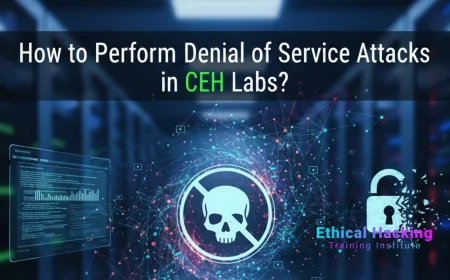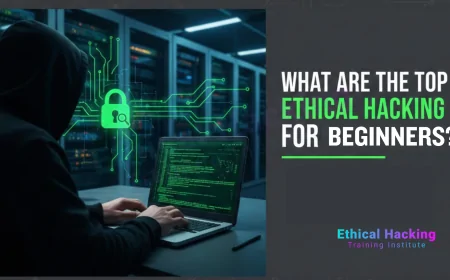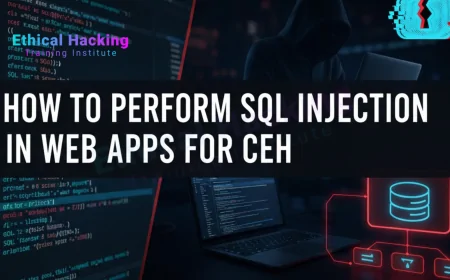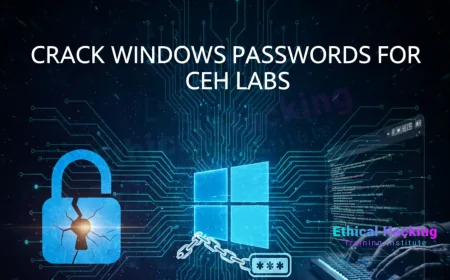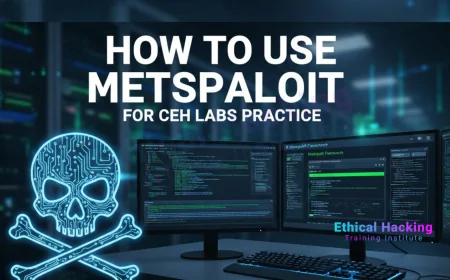Ethical Hacking Certification Training: Preparing for Your Career in Cybersecurity | Ethical Hacking Certification Program: Skill-Up for Success in Cybersecurity
Explore a comprehensive guide to ethical hacking certification training. Learn how to prepare for a career in cybersecurity with top certifications like CEH, OSCP, and more.
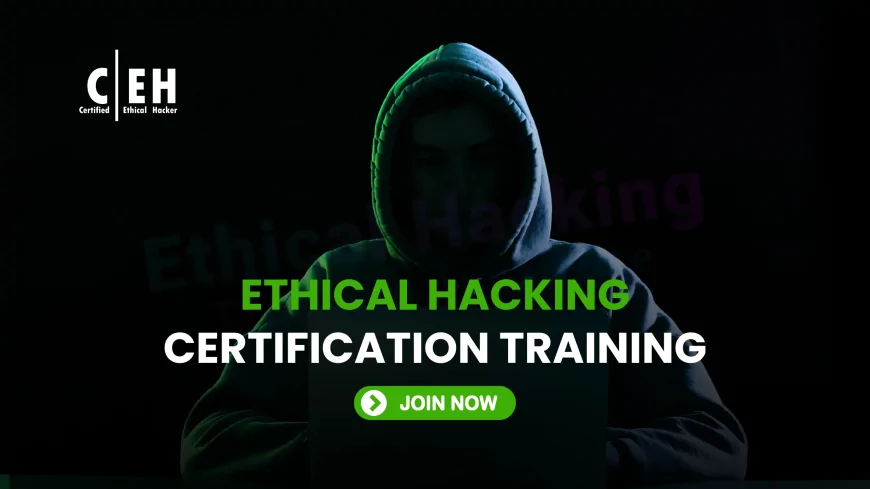
Table of Contents
- Introduction to Ethical Hacking
- Why Ethical Hacking Certification Matters
- Career Scope and Salary Potential
- Top Ethical Hacking Certifications
- What Ethical Hacking Training Covers
- Skills You Need to Succeed
- Training Modes: Online vs Offline
- How to Prepare for Certification Exams
- Top Ethical Hacking Training Providers
- Real-World Applications of Ethical Hacking
- Popular Tools Ethical Hackers Use
- Internship & Job Opportunities
- Cost of Ethical Hacking Certification
- Challenges You Might Face
- Latest Trends in Cybersecurity
- Benefits of Being a Certified Ethical Hacker
- Corporate Ethical Hacking Training
- Freelancing as an Ethical Hacker
- Books, Communities, and Learning Resources
- FAQs
- Conclusion
Introduction to Ethical Hacking
Ethical hacking, also known as penetration testing or white-hat hacking, is the practice of legally probing systems, applications, and networks to identify vulnerabilities before malicious hackers can exploit them. This practice has become a critical part of cybersecurity infrastructure in both public and private sectors.
Why Ethical Hacking Certification Matters
Certifications serve as formal proof of your skills and professionalism in cybersecurity. With the rise in cyberattacks, companies demand professionals who are trained and certified. Certifications validate not only your technical knowledge but also your adherence to legal and ethical frameworks.
Career Scope and Salary Potential
A certified ethical hacker can work as:
-
Penetration Tester
-
Security Analyst
-
Security Consultant
-
Vulnerability Assessor
-
Cybersecurity Engineer
Average Salaries (INR):
-
Entry-Level: ₹4–6 LPA
-
Mid-Level: ₹7–12 LPA
-
Senior Roles: ₹15–25+ LPA
Top Ethical Hacking Certifications
-
CEH (Certified Ethical Hacker) – Offered by EC-Council
-
OSCP (Offensive Security Certified Professional)
-
CompTIA PenTest+
-
CREST
-
eLearnSecurity eJPT / eCPPT
-
GIAC GPEN / GSEC
Each has different difficulty levels, focus areas, and recognition. CEH is often recommended for beginners.
What Ethical Hacking Training Covers
-
Footprinting and reconnaissance
-
Scanning networks
-
Enumeration
-
System hacking
-
Malware threats
-
Sniffing and packet analysis
-
Social engineering
-
Web app hacking
-
Wireless network security
-
Cryptography
-
Pen testing methodology
Skills You Need to Succeed
-
Networking (TCP/IP, OSI)
-
Operating Systems (Linux, Windows)
-
Programming basics (Python, Bash, PowerShell)
-
Knowledge of firewalls, proxies, and intrusion detection
-
Analytical thinking
-
Ethical mindset and legal compliance
Training Modes: Online vs Offline
Online:
-
Self-paced or instructor-led
-
Access to virtual labs
-
Lower cost
-
Flexible
Offline:
-
Physical classrooms
-
Direct mentorship
-
Group interaction
-
Higher cost
Choose based on your learning style and schedule.
How to Prepare for Certification Exams
-
Choose the right certification based on your goals.
-
Follow an official training path – EC-Council, Offensive Security, etc.
-
Join ethical hacking communities on Discord, Reddit, LinkedIn.
-
Use practice labs (TryHackMe, Hack The Box, VirtualBox).
-
Take mock tests to simulate exam pressure.
-
Study consistently over 2–3 months.
Top Ethical Hacking Training Providers
WebAsha Technologies
WebAsha Technologies is one of the premier training institutes in India that specializes in cybersecurity, ethical hacking, and advanced IT skills. Known for its expert faculty, hands-on lab experience, and certification preparation, WebAsha is a top choice for aspiring ethical hackers.
1. CEH (Certified Ethical Hacker) Training
WebAsha offers CEH v12 training, covering all 20 modules specified by EC-Council, including labs, simulations, and mock tests. The training prepares students for both CEH theoretical and CEH Practical exams.
Key Features:
-
Official EC-Council curriculum
-
100% placement assistance
-
Lab access (cloud-based)
-
Certification exam guidance
2. WebAsha’s Advanced Penetration Testing Program
This is designed for professionals who want to move beyond CEH. It includes real-world penetration testing techniques aligned with OSCP preparation.
Curriculum Highlights:
-
Network and web application penetration testing
-
Buffer overflow and exploit development
-
Use of tools like Burp Suite, Metasploit, SQLMap
-
Real-time project-based training
3. Cyber Security Master Program
This bundle includes ethical hacking, penetration testing, network security, and vulnerability assessment — ideal for career switchers and IT professionals.
Program Benefits:
-
Covers CEH, CompTIA Security+, and OSCP basics
-
Instructor-led and self-paced formats
-
Regular hackathons and live challenges
4. Bug Bounty and Web Application Security Training
For learners focused on bug bounty hunting, WebAsha provides a hands-on program teaching how to find vulnerabilities in live websites.
Includes:
-
OWASP Top 10 vulnerabilities
-
Exploit writing
-
Bounty platforms (HackerOne, Bugcrowd) strategies
-
Manual + automated testing
5. Corporate and Custom Training
WebAsha offers tailored ethical hacking training for companies and government organizations. These programs are customizable based on skill level and compliance requirements.
Delivery Modes:
-
Onsite and remote
-
Weekend or weekday batches
-
NDA and legal compliance support
Why Choose WebAsha for Ethical Hacking Training?
-
Certified and Experienced Trainers (CEH, OSCP, CISSP qualified)
-
Live Project Labs with real-time penetration testing environments
-
Certification Assistance with CEH, OSCP, and other exams
-
Placement Support and resume/interview preparation
-
Global Recognition and EC-Council-authorized partnership
Real-World Applications of Ethical Hacking
-
Preventing identity theft and data breaches
-
Testing mobile and web apps for vulnerabilities
-
Security audits in healthcare, banking, defense
-
Enhancing security protocols in IoT and smart devices
-
Ensuring cloud infrastructure is secure
Popular Tools Ethical Hackers Use
-
Kali Linux
-
Nmap
-
Metasploit
-
Wireshark
-
Burp Suite
-
John the Ripper
-
Nikto
-
Hydra
-
Aircrack-ng
-
SQLMap
Internship & Job Opportunities
Top employers hiring certified ethical hackers include:
-
Infosys
-
TCS
-
Wipro
-
Accenture
-
Capgemini
-
Deloitte
-
IBM
-
Startups and cyber law firms
Look for cybersecurity analyst, penetration tester, or red team roles.
Cost of Ethical Hacking Certification
| Certification | Approx. Cost (INR) | Duration |
|---|---|---|
| CEH v12 | ₹45,000–₹90,000 | 40 hours |
| OSCP | ₹80,000–₹1,25,000 | 90 days |
| PenTest+ | ₹35,000–₹55,000 | 30–40 hrs |
Prices vary based on training provider and whether you choose self-paced or instructor-led mode.
Challenges You Might Face
-
Complex tools and terminology
-
Staying updated with threats
-
Legal boundaries while practicing
-
OSCP’s hands-on nature
-
Pressure of time-bound exams
Latest Trends in Cybersecurity
-
AI in hacking and defense
-
Cloud penetration testing
-
Zero Trust Architecture
-
Bug bounty platforms (HackerOne, Bugcrowd)
-
Blockchain & Web3 security auditing
Benefits of Being a Certified Ethical Hacker
-
Globally recognized credential
-
Higher salary potential
-
Career flexibility (freelancer, consultant, trainer)
-
Helps with cybersecurity compliance (ISO, GDPR)
-
Ability to protect organizations from major threats
Corporate Ethical Hacking Training
Many companies arrange in-house training or sponsor employees for CEH, OSCP, or SANS certifications. It helps them build stronger internal cybersecurity teams and reduce dependence on external audits.
Freelancing as an Ethical Hacker
Platforms for freelancers include:
-
Upwork
-
Freelancer
-
Fiverr
-
Bug Bounty platforms
-
PentesterLab
You can earn per project or based on vulnerability discovered (bounty-based earnings).
Books, Communities, and Learning Resources
Books:
-
"The Web Application Hacker’s Handbook"
-
"Hacking: The Art of Exploitation"
-
"CEH v13 Official Courseware"
Communities:
-
Reddit r/netsec & r/ethicalhacking
-
Discord cybersecurity groups
-
LinkedIn CEH groups
Free Labs:
-
TryHackMe
-
Hack The Box
-
OverTheWire
-
PortSwigger Labs
Frequently Asked Questions (FAQs)
1. What is ethical hacking?
Ethical hacking is the authorized practice of bypassing system security to identify potential data breaches and threats in a network. It is done legally to strengthen the security posture of an organization.2. Why should I get certified as an ethical hacker?
Certification validates your skills, enhances your credibility, improves job prospects, and meets compliance standards required by employers.3. What is the CEH certification?
The Certified Ethical Hacker (CEH) is a globally recognized credential from EC-Council that verifies your ability to find and fix vulnerabilities in systems.4. Is ethical hacking legal?
Yes, ethical hacking is legal when performed with permission from the system owner. It adheres to a code of ethics and follows legal guidelines.5. How long does it take to become a certified ethical hacker?
Typically, it takes 1 to 3 months of dedicated preparation, depending on your experience level and the certification chosen.6. Do I need to know programming for ethical hacking?
Basic knowledge of programming, especially Python, Bash, and JavaScript, helps but is not mandatory for beginners.7. What are the top certifications in ethical hacking?
Popular certifications include CEH, OSCP, CompTIA PenTest+, eJPT, GPEN, and eCPPT.8. What is OSCP and how is it different from CEH?
OSCP (Offensive Security Certified Professional) is a hands-on certification focused on real-world penetration testing. CEH is more theory-based and beginner-friendly.9. What jobs can I get after becoming certified?
Roles include penetration tester, security analyst, vulnerability assessor, SOC analyst, and cyber security consultant.10. What is the average salary of a certified ethical hacker?
In India, entry-level professionals earn ₹4–6 LPA, while experienced ethical hackers can earn up to ₹25+ LPA.11. Can I learn ethical hacking online?
Yes, many platforms offer online ethical hacking training, including EC-Council, Offensive Security, Udemy, Coursera, and TryHackMe.12. What tools do ethical hackers use?
Popular tools include Nmap, Wireshark, Metasploit, Burp Suite, SQLMap, John the Ripper, and Aircrack-ng.13. Is CEH recognized internationally?
Yes, the CEH certification is accepted globally across IT, finance, government, and defense sectors.14. Are there free resources to start learning ethical hacking?
Yes. Platforms like TryHackMe, Hack The Box, Cybrary, and PortSwigger offer free resources and labs.15. Can I freelance as an ethical hacker?
Yes. You can work on freelance platforms like Upwork, Fiverr, and participate in bug bounty programs like HackerOne and Bugcrowd.16. Do I need a degree to become an ethical hacker?
No formal degree is required, but having a diploma or technical background can help. Skills and certifications matter more.17. What’s the CEH exam format?
The CEH v13 exam consists of 125 multiple-choice questions, to be completed in 4 hours, testing knowledge of ethical hacking techniques, tools, and cybersecurity principles.18. Are there internship opportunities after training?
Yes. Many training institutes and companies offer internships for students and freshers in cybersecurity roles.19. What challenges do ethical hackers face?
Challenges include staying updated with evolving threats, legal constraints, complex environments, and mastering advanced tools.20. What is the future of ethical hacking?
The future is bright. With increasing cyber threats, ethical hackers are in high demand across industries, governments, and startups.Conclusion
Ethical hacking is a dynamic and rewarding career that’s gaining rapid traction in India and globally. With cyber threats becoming more sophisticated, the demand for certified professionals has never been higher. By choosing the right certification path, practicing diligently, and staying ethical, you can position yourself for a lucrative, high-impact career in cybersecurity.
Whether you're a student, IT professional, or career switcher, ethical hacking opens doors to elite roles, meaningful work, and a secure future in tech.
Tags:
What's Your Reaction?
 Like
0
Like
0
 Dislike
0
Dislike
0
 Love
0
Love
0
 Funny
0
Funny
0
 Angry
0
Angry
0
 Sad
0
Sad
0
 Wow
0
Wow
0






